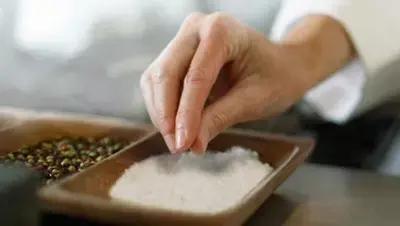- Home
- Medical news & Guidelines
- Anesthesiology
- Cardiology and CTVS
- Critical Care
- Dentistry
- Dermatology
- Diabetes and Endocrinology
- ENT
- Gastroenterology
- Medicine
- Nephrology
- Neurology
- Obstretics-Gynaecology
- Oncology
- Ophthalmology
- Orthopaedics
- Pediatrics-Neonatology
- Psychiatry
- Pulmonology
- Radiology
- Surgery
- Urology
- Laboratory Medicine
- Diet
- Nursing
- Paramedical
- Physiotherapy
- Health news
- Fact Check
- Bone Health Fact Check
- Brain Health Fact Check
- Cancer Related Fact Check
- Child Care Fact Check
- Dental and oral health fact check
- Diabetes and metabolic health fact check
- Diet and Nutrition Fact Check
- Eye and ENT Care Fact Check
- Fitness fact check
- Gut health fact check
- Heart health fact check
- Kidney health fact check
- Medical education fact check
- Men's health fact check
- Respiratory fact check
- Skin and hair care fact check
- Vaccine and Immunization fact check
- Women's health fact check
- AYUSH
- State News
- Andaman and Nicobar Islands
- Andhra Pradesh
- Arunachal Pradesh
- Assam
- Bihar
- Chandigarh
- Chattisgarh
- Dadra and Nagar Haveli
- Daman and Diu
- Delhi
- Goa
- Gujarat
- Haryana
- Himachal Pradesh
- Jammu & Kashmir
- Jharkhand
- Karnataka
- Kerala
- Ladakh
- Lakshadweep
- Madhya Pradesh
- Maharashtra
- Manipur
- Meghalaya
- Mizoram
- Nagaland
- Odisha
- Puducherry
- Punjab
- Rajasthan
- Sikkim
- Tamil Nadu
- Telangana
- Tripura
- Uttar Pradesh
- Uttrakhand
- West Bengal
- Medical Education
- Industry
Salt Substitute Effectively Reduces Blood Pressure, Finds Study

Excess sodium intake is a causal risk factor for hypertension, and reducing sodium from dietary salt is advocated as a first-line treatment of hypertension by most national and international hypertension societies, including in India. A recent study suggests, replacing regular common salt with salt substitute led to a substantial reduction in systolic blood pressure (SBP) in hypertensive patients. The research has been published in The American Journal of Clinical Nutrition on March 30, 2021.
A practical method for reducing sodium from discretionary salt use is to replace regular salt (100% sodium chloride) with a "salt substitute," a product that replaces a portion of the sodium chloride, in regular salt with other salts such as potassium chloride (usually 25–30%) and/or magnesium sulphate (10–14%). However, it remains unclear if salt substitutes reduce blood pressure (BP) among Indian hypertensive patients. Therefore, researchers of the George Institute for Global Health, Australia, conducted a study to examine the acceptability, usage, and BP effects of a reduced-sodium and added-potassium salt substitute among hypertensive patients.
Salt Substitute in India Study (SSiIS) was a double-blind, randomized control study with an intervention duration of 3 months in 502 participants with hypertension from 7 villages in rural India. Researchers randomly assigned the patients to receive either regular salt (100% sodium chloride) or the salt substitute (70% sodium chloride/30% potassium chloride blend) and advised to replace all home salt use. The major outcome was the change in systolic BP (SBP) from baseline to 3 mo comparing the salt substitute and regular salt groups. The researchers also assessed the change in diastolic BP (DBP), 24-h urinary biomarkers, and self-reported use and satisfaction with the study-salt provided. A total of 494 (98%) participants completed one month, and 476 (95%) participants completed the 3-mo follow-up.
Key findings of the study were:
- By the 3rd month, the researchers noted that the patients in the salt substitute group had significantly lesser SBP by 4.6 mmHg and DBP by 1.1 mmHg.
- They also noted a significant increase in 24-h urinary potassium excretion in the salt substitute group by 0.24 g/d and a decrease in the urinary sodium to potassium ratio by 0.71 compared with the control group.
- The participants reported that they used the study-salt nearly every day of the week and rated the taste of the study salts similarly.
The authors concluded, "The reduced-sodium added-potassium salt led to a substantial reduction in SBP in hypertensive patients, supporting salt substitution as an effective, low-cost intervention for BP lowering in rural India."
For further information:
Dr Kartikeya Kohli is an Internal Medicine Consultant at Sitaram Bhartia Hospital in Delhi with super speciality training in Nephrology. He has worked with various eminent hospitals like Indraprastha Apollo Hospital, Sir Gangaram Hospital. He holds an MBBS from Kasturba Medical College Manipal, DNB Internal Medicine, Post Graduate Diploma in Clinical Research and Business Development, Fellow DNB Nephrology, MRCP and ECFMG Certification. He has been closely associated with India Medical Association South Delhi Branch and Delhi Medical Association and has been organising continuing medical education programs on their behalf from time to time. Further he has been contributing medical articles for their newsletters as well. He is also associated with electronic media and TV for conduction and presentation of health programs. He has been associated with Medical Dialogues for last 3 years and contributing articles on regular basis.
Dr Kamal Kant Kohli-MBBS, DTCD- a chest specialist with more than 30 years of practice and a flair for writing clinical articles, Dr Kamal Kant Kohli joined Medical Dialogues as a Chief Editor of Medical News. Besides writing articles, as an editor, he proofreads and verifies all the medical content published on Medical Dialogues including those coming from journals, studies,medical conferences,guidelines etc. Email: drkohli@medicaldialogues.in. Contact no. 011-43720751


